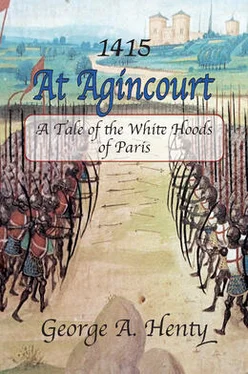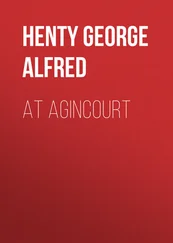“Yes, we were fortunate,” Guy said, “in falling across the ship of the French admiral, Count de Valles. Our men all fought stoutly, and the archers having cleared the way for us and slain many of their crew, we captured them, and I hold the count and five French knights to ransom.”
“That will fill your purse rarely, Guy. But let us hear more of this fighting. De Valles's ship must have been a great one, and if you took it with but your own sixty men it must have been a brilliant action.”
Guy then gave a full account of the fight, and of the subsequent capture of one of the Spanish carracks with the aid of another English ship.
“If the Duke of Bedford himself came on board,” Lord Eustace said, “and sent you some reinforcements, he must have thought highly of the action; indeed he cannot but have done so, or he would not have come personally on board. Did he speak to the king of it?”
“He did, and much more strongly, it seems to me, than the affair warranted, for at the banquet the day before yesterday his majesty was graciously pleased to appoint me a knight-banneret, and to bestow upon me the estates of Penshurst, adding thereto the royal manors of Stoneham and Piverley.”
“A right royal gift!” Lord Eustace said, while exclamations of pleasure broke from the others.
“I congratulate you on your new honour, which you have right worthily earned. Sir John, you may well be proud of this son of yours.”
“I am so, indeed,” Sir John Aylmer said heartily. “I had hoped well of the lad, but had not deemed that he would mount so rapidly. Sir Richard Fulk had a fine estate, and joined now to the two manors it will be as large as those of Summerley, even with its late additions.”
“I am very glad,” Dame Margaret said, “that the king has apportioned you an estate so near us, for it is scarce fifteen miles to Penshurst, and it will be but a morning ride for you to come hither.”
“Methinks, wife,” Lord Eustace said with a smile, “we were somewhat hasty in that matter of Sir William Bailey, for had we but waited Agnes might have done better.”
“She chose for herself,” Dame Margaret replied with an answering smile. “I say not that in my heart I had not hoped at one time that she and Guy might have come together, for I had learnt to love him almost as if he had been my own, and would most gladly have given Agnes to him had it been your wish as well as theirs; but I have seen for some time past that it was not to be, for they were like brother and sister to each other, and neither had any thought of a still closer relation. Had it not been so I should never have favoured Sir William Bailey's suit, though indeed he is a worthy young man, and Agnes is happy with him. You have not been to your castle yet, Guy?” she asked, suddenly changing the subject.
“No, indeed, Lady Margaret, I rode straight here from London, deeming this, as methinks that I shall always deem it, my home.”
“We must make up a party to ride over and see it to-morrow,” Lord Eustace said. “We will start early, wife, and you and Katarina can ride with us. Charlie will of course go, and Sir John. We could make a horse-litter for the count, if he thinks he could bear the journey.
“Methinks that I had best stay quietly here,” the Italian said. “I have had enough of litters for a time, and the shaking might make my wound angry again.”
“Nonsense, child!” he broke off as Katarina whispered that she would stay with him; “I need no nursing now; you shall ride with the rest.”
Accordingly the next day the party started early. Charlie was in high spirits; he had grown into a sturdy boy, and was delighted at the good fortune that had befallen Guy, whom he had regarded with boundless admiration since the days in Paris. Katarina was in one of her silent moods, and rode close to Lady Margaret. Long Tom, who was greatly rejoiced on hearing of the honours and estates that had been bestowed on Guy, rode with two of his comrades in the rear of the party. Penshurst was a strong castle, though scarcely equal in size to Summerley; it was, however, a more comfortable habitation, having been altered by the late owner's father, who had travelled in Italy, with a view rather to the accommodation of its inmates than its defence, and had been furnished with many articles of luxury rare in England.
“A comfortable abode truly, Guy!” his father said. “It was well enough two hundred years since, when the country was unsettled, for us to pen ourselves up within walls, but there is little need of it now in England, although in France, where factions are constantly fighting against each other, it is well that every man should hold himself secure from attack. But now that cannon are getting to so great a point of perfection, walls are only useful to repel sudden attacks, and soon crumble when cannon can be brought against them. Me thinks the time will come when walls will be given up altogether, especially in England, where the royal power is so strong that nobles can no longer war with each other.”
“However, Guy,” Lord Eustace said, “'tis as well at present to have walls, and strong ones; and though I say not that this place is as strong as Villeroy, it is yet strong enough to stand a siege.”
Guy spent an hour with the steward, who had been in charge of the castle since the death of Sir Richard Fulk, and who had the day before heard from a royal messenger that Sir Guy had been appointed lord of the estates. The new owner learned from him much about the extent of the feu, the number of tenants, the strength that he would be called upon to furnish in case of war, and the terms on which the vassals held their tenure.
“Your force will be well-nigh doubled,” the steward said in conclusion, “since you tell me that the manors of Stoneham and Piverley have also fallen to you.”
“'Tis a fair country,” Guy said as the talk ended, “and one could wish for no better. I shall return to Summerley to-day, but next Monday I will come over here and take possession, and you can bid the tenants, and those also of the two manors, to come hither and meet me at two o'clock.”
“Well, daughter,” the Count of Montepone said to Katarina as she was sitting by his couch in the evening, “so you think that Penshurst is a comfortable abode?”
“Yes, father, the rooms are brighter and lighter than these and the walls are all hung with arras and furnished far more comfortably.”
“Wouldst thou like to be its mistress, child?”
A bright flush of colour flooded the girl's face.
“Dost mean it, father?” she asked in a voice hardly above a whisper.
“Why not, child? You have seen much of this brave young knight, whom, methinks, any maiden might fall in love with. Art thou not more sensible to his merits than was Mistress Agnes?”
“He saved my life, father.”
“That did he, child, and at no small risk to his own: Then do I understand that such a marriage would be to your liking?”
“Yes, father,” she said frankly, “but I know not that it would be to Sir Guy's.”
“That is for me to find out,” he said. “I asked Lady Margaret a few days ago what she thought of the young knight's inclinations, and she told me that she thought indeed he had a great liking for you, but that in truth you were so wayward that you gave him but little chance of showing it.”
“How could I let him see that I cared for him, father, when I knew not for certain that he thought aught of me, and moreover, I could not guess what your intentions for me might be.”
“I should not have sent you where you would often be in his company, Katarina, unless I had thought the matter over deeply. It was easy to foresee that after the service he had rendered you you would think well of him, and that, thrown together as you would be, it was like enough that you should come to love each other. I had cast your horoscope and his and found that you would both be married about the same time, though I could not say that it would be to each other. I saw enough of him during that time in Paris to see that he was not only brave, but prudent and discreet. I saw, too, from his affection to his mistress, that he would be loyal and honest in all he undertook, that it was likely that he would rise to honour, and that above all I could assuredly trust your happiness to him. He was but a youth and you a girl, but he was bordering upon manhood and you upon womanhood. I marked his manner with his lady's daughter and saw that she would be no rival to you. Had it been otherwise I should have yielded to your prayers, and have kept you with me in France. Matters have turned out according to my expectation. I can give you a dowry that any English noble would think an ample one with his bride; and though Guy is now himself well endowed he will doubtless not object to such an addition as may enable him, if need be, to place in the field a following as large as that which many of the great nobles are bound to furnish to their sovereign. I will speak to him on the subject to-morrow, Katarina.”
Читать дальше












